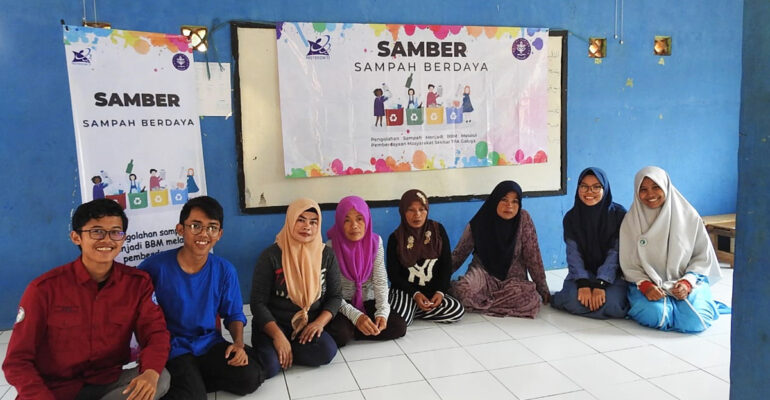IPB students make garbage into oil

IPB University students promoted the Samber program. This innovation was born in order to process waste into fuel oil (BBM) through community empowerment around the Galuga Village Final Disposal Site (TPA), Cibungbulang District, Bogor Regency. Samber is a Community Service Student Creativity Program (PKM-M) of IPB University students consisting of Mulyati Kholida, Lazuardi Bahrul Hidayat, Irma Syofyanti, Maesaroh and Rabbani Elha Ahmad. This activity was under the supervision Lukmanul Hakim Zaini, S.Hut, M.Sc.
The Chairman of the Samber PKM-M, Mulyati Kholida, said that Galuga Village is one of the villages which is a Waste Disposal Site (TPA). It is noted that the landfill is around 20 hectares.
"The people of Kampung Baru who are not far from the TPA Galuga are many who work as scavengers. But unfortunately, the garbage collected is only sold directly. So far, the processing of waste is only on a micro scale, there is no waste management that can increase the added value of the waste. Plastic waste when processed properly and properly can be a high-value product. One of the waste treatments that is developed is to convert plastic waste into fuel," said Mulyati.
"The garbage found in TPA Galuga can actually be processed into BBM and become a source of additional income for the villagers. Plastic waste that is converted into fuel includes tertiary recycling. One of the ways is the cracking process, which is by breaking the polymer chain into lower molecular weight compounds. The results of this process can be used as chemicals and fuels. "This landfill has the potential to become an economic field, people collect and sell garbage directly to collectors. Seeing this opportunity, we took the initiative to create a "SamBer (Solid Waste) Work Organization" which works in the field of processing waste into BBM (Fuel Oil) so that it can improve the economy of people living around the landfill of Galuga garbage. The intended fuel is 60 percent of diesel fuel, 25 percent of gasoline and 15 percent of kerosene with a management structure coming from the community.
The administrators acted as movers and the surrounding community who were interested in joining the "SamBer" work organization acted as workers. Work Organization is run by using the B3 program, namely, Insight, Moves, and Impacts. With the establishment of a "SamBer" work organization, it is hoped that the community will want to explore the potential that can be obtained from processing waste (Insightful), eager to process waste into high-value (mobile) products, and increase community income around TPA Galuga so that they can improve their economy (Impact).
Mulyati emphasized that the goal to be achieved in community empowerment is to reduce and overcome the problem of plastic waste and improve community skills in processing plastic waste into fuel which has an impact on increasing community income. Skill improvement is done by processing waste, especially thermoplastic type plastic waste into BBM.
"If this program runs perfectly, it is hoped that it can help increase the income of the people who work as scavengers and arrange guidebooks which will be packaged into a single educational media that has the opportunity to get an ISBN (International Standard Book Number) patent, and educational media will be recommended for areas around the place other final disposal," Mulyati said. (RYS)



